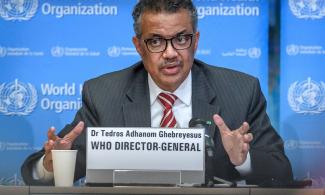
"Both names will be used simultaneously for one year while “Monkeypox” is phased out, according to the global health organisation.
The World Health Organisation, WHO has rebranded Monkeypox to “Mpox” following the receipt of several complaints and remarks that the current name for the disease appears "racist and stigmatising.”
"Both names will be used simultaneously for one year while “Monkeypox” is phased out, according to the global health organisation.
REZO, a men's health organisation, proposed the name “Mpox,” with its director saying that removing the monkey imagery helped people take the health emergency seriously.
Symptoms of Monkeypox include a rash, fever, chills, swollen lymph nodes, exhaustion, and headaches.
Monkeypox is a rare disease caused by infection with monkeypox virus. Monkeypox occurs throughout Central and West Africa, often near tropical rain forests.
People become infected with the monkeypox virus through contact with the bodily fluids of infected animals or humans (alive or dead), including respiratory droplets, or through contact with materials contaminated with the virus.
In 2021, cases of Monkeypox were reported in Nigeria in the following states: Delta, Lagos, Bayelsa, Rivers, Edo, Federal Capital Territory, Niger, and Ogun.
An international collaboration of clinicians from 16 countries has also identified single genital lesions and mouth sores or anus as symptoms of the virus.
Some of the symptoms were so severe that patients had to be admitted to the hospital.
A second strain of monkeypox was discovered in the UK in September after a person who had travelled to West Africa was diagnosed.
Professor Neil Ferguson, a leading infectious disease expert, said in October that the UK appeared to be winning the battle against the disease, with case numbers dropping - but he warned against complacency and highlighted the risk of resurgence.
According to WHO data, there have been over 80,000 cases and 55 deaths worldwide.
Last week data revealed a single dose of the monkeypox vaccine provides 78% protection against the virus, according to the UK Health Security Agency (UKHSA).
The analysis reviewed data for the Bavarian Nordic vaccine in England between 4 July and 3 November.
The single shot was found to provide 78% protection 14 days after vaccination, with a second dose expected to provide even greater and longer-lasting protection, according to the UKHSA.
According to the agency, more than 55,000 doses of the vaccine have been delivered thus far.
Scientists discovered earlier this month that disease transmission can occur up to four days before symptoms appear.
The spread of the disease before symptoms appear could be much more "substantial" than previously thought, according to UKHSA researchers.
According to the study, more than half (53%) of transmission occurs in the pre-symptomatic phase, implying that asking people to isolate if they notice symptoms will not prevent many infections. It also implies that even if contacts are tracked down, they may have already spread the virus to others.
The study concluded that people would need to isolate for 16 to 23 days to detect 95% of those with a potential infection.